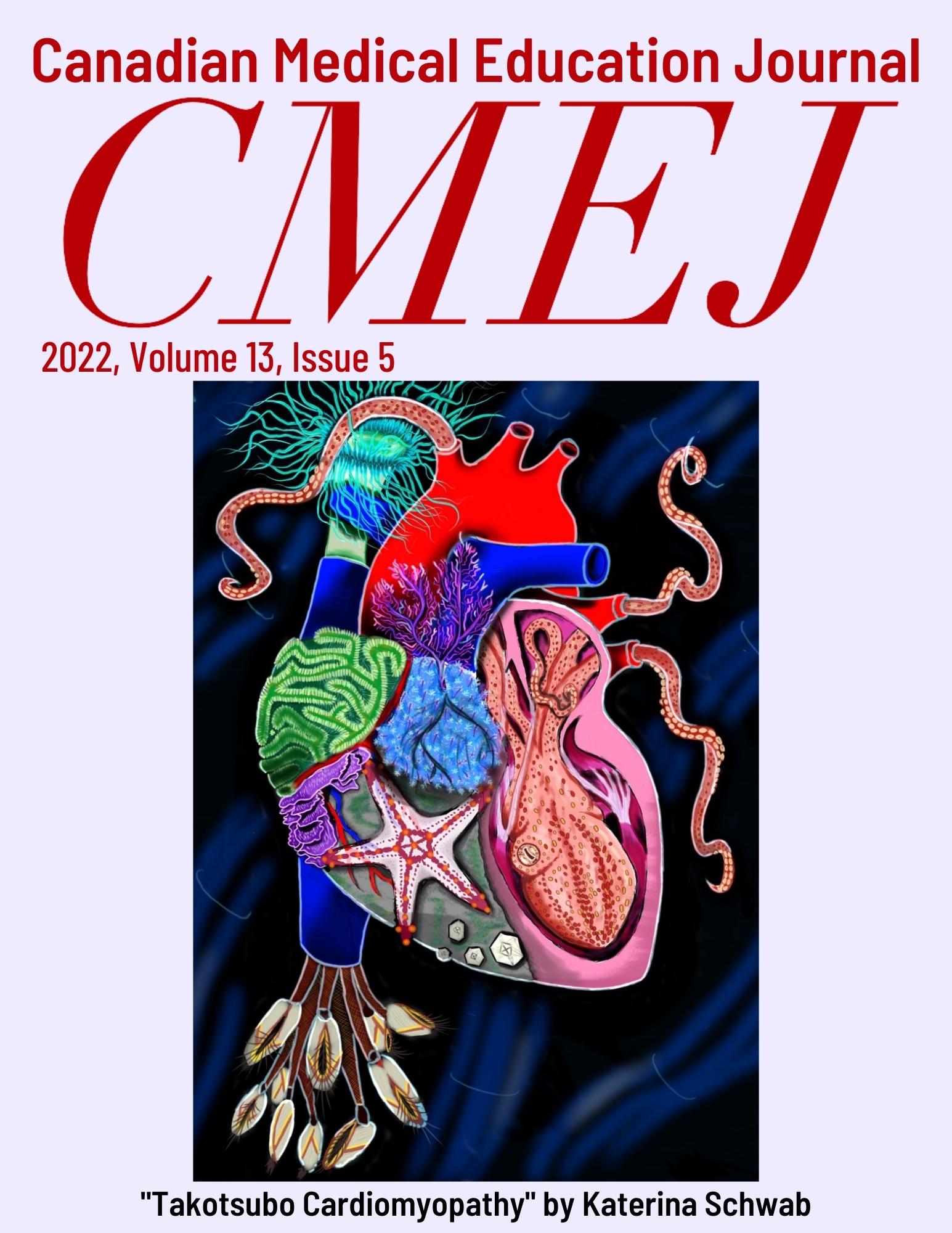Clinical reasoning and simulation: facilitating hypothesis prioritization using simulated patients. Data from quantitative research
DOI:
https://doi.org/10.36834/cmej.73556Abstract
Background: Prioritizing diagnostic hypotheses can be difficult for novice medical students given their limited clinical exposure. Simulated clinical reasoning (CR) clinics allow students to practice focused histories with a simulated patient (SP). The delivery of clinical data by SPs can influence hypothesis generation.
Objective: This pilot study seeks to test whether the transmission of key elements through SP acting influences CR prioritization among medical students.
Method: The diagnostic hypotheses of two cohorts of students of the same academic level were compared following a virtual interview with an SP. The SPs in the experimental group were given a targeted script and briefing on key elements while the SPs in the control group were given a traditional script and briefing. The difference between the distributions of frequencies of the hypotheses of the two groups was determined using the chi-square calculation.
Results: The students in the experimental group prioritized expert-validated hypotheses more than those in the control group. The control group showed greater variability in their diagnostic choices.
Conclusion: Targeting the delivery of key elements by SPs could be a way to help novice medical students prioritize their diagnostic hypotheses. Simulated CR clinics therefore become a space for learning about CR in the absence of clinical exposure. The risk of inducing premature closure of clinical reasoning needs further research.
References
Audétat M-C, Sader J, Coen M. Clinical reasoning and COVID 19 pandemic: current influencing factors Let us take a step back. Intern Emerg Med. 2021;16(4):1109-11.
https://doi.org/10.1007/s11739-020-02516-8
K D. Online clinical teaching: a simple model to improve students' communication and clinical reasoning skills on distance learning e-platform. MedEdPublish2020.
Giet D, Massart V, Gagnon R, Charlin B. Le test de concordance de script en 20 questions. Pédagogie médicale. 2013;14(1):39-48. https://doi.org/10.1051/pmed/2012026
Hoff L, Bestawros A, Kassis J, Charlin B. Le test de concordance de script comme outil d'enseignement et d'apprentissage : un projet-pilote pour les étudiants de première année de médecine. Pédagogie médicale. 2010;11(1):51-6. https://doi.org/10.1051/pmed/2010006
Audetat M-C, Laurin S, Sanche G. Aborder le raisonnement clinique du point de vue pédagogique II. Les difficultés de raisonnement clinique à l'étape du recueil initial des données et de la génération d'hypothèses. Pédagogie médicale. 2011;12(4):231-6. https://doi.org/10.1051/pmed/2011110
Tremblay M-L, Lafleur A, Leppink J, Dolmans DHJM. The simulated clinical environment: cognitive and emotional impact among undergraduates. Med teach. 2017;39(2):181-7. https://doi.org/10.1080/0142159X.2016.1246710
Groves M, Scott I, Alexander H. Assessing clinical reasoning: a method to monitor its development in a PBL curriculum. Med teach. 2002;24(5):507-15. https://doi.org/10.1080/01421590220145743
Harendza, S., Gärtner, J., Zelesniack, E., & Prediger, S. (2020). Evaluation of a telemedicine-based training for final-year medical students including simulated patient consultations, documentation, and case presentation. GMS J Med. Educ. 37(7), Doc94. https://doi.org/10.3205/zma001387
Nendaz M, Charlin B, Leblanc V, Bordage G. Le raisonnement clinique: données issues de la recherche et implications pour l'enseignement. Pédagogie médicale. 2005;6(4):235-54. https://doi.org/10.1051/pmed:2005028
Charlin B, Boshuizen HPA, Custers EJ, Feltovich PJ. Scripts and clinical reasoning. Med ed. 2007;41(12):1178-84. https://doi.org/10.1111/j.1365-2923.2007.02924.x
Gruppen LD, Palchik NS, Wolf FM, Laing TJ, Oh MS, Davis WK. Medical student use of history and physical information in diagnostic reasoning. Arthritis and rheumatism. 1993;6(2):64-70. https://doi.org/10.1002/art.1790060204
Renaud J-S, Ratté F, F. Thériault J, Roy AM, Côté L. Questions de planification clinique : un nouvel outil pour évaluer la capacité des étudiants en médecine à identifier les éléments-clés discriminants d'un diagnostic différentiel. Pédagogie médicale. 2016;17(1):65-75. https://doi.org/10.1051/pmed/2016024
Lafleur A, Cote L, Leppink J. Influences of OSCE design on students' diagnostic reasoning. Medical education. 2015;49(2):203-14. https://doi.org/10.1111/medu.12635. PMID: 25626751.
Visser CLF, Wouters A, Croiset G, Kusurkar RA. Scaffolding clinical reasoning of health care students: a qualitative exploration of clinicians' perceptions on an interprofessional obstetric ward. J Med Educ Curric Dev. 2020;7:2382120520907915- https://doi.org/10.1177/2382120520907915
Cristina B, Ianis C, Anne-Helene U, et al. Simulated patient and role play methodologies for communication skills and empathy training of undergraduate medical students. BMC med educ. 2020;20(1):1-491.
Burnier I, Bouchard-Lamothe D, Khouani Z. Patient simulé et patient standardisé : peut-on en finir avec le terme SPs ? Pédagogie médicale. 2020;20(3):147-9. https://doi.org/10.1051/pmed/2020015
Burnier I, Fotsing S, Bouchard-Lamothe D, Amrani S. Briefing des patients simulés en cinq étapes : effets perçus sur la préparation à la pratique simulée. Données d'un projet pilote. Pédagogie médicale. 2019;20(4):177-85. https://doi.org/10.1051/pmed/2020021
Grosjean S, Cherba M, Matte F, Gauthier-Beaupré A, Burnier I, Myles D. How simulated patients' 'showing practices' contribute to improving medical students’ 'sensory awareness' during teleconsultations: a multimodal interaction analysis. Conference of the International Association for Dialogue Analysis; Virtual event. 2021.
Norman G, Young M, Brooks L. Non-analytical models of clinical reasoning: the role of experience. Med ed. 2007;41(12):1140-5. https://doi.org/10.1111/j.1365-2923.2007.02914.x
Konopasky A, Artino AR, Battista A, et al. Understanding context specificity: the effect of contextual factors on clinical reasoning. Diagnosis (Berlin, Germany). 2020;7(3):257-64. https://doi.org/10.1515/dx-2020-0016
Downloads
Published
Issue
Section
License
Copyright (c) 2022 Isabelle Burnier, Juliane Ratté, Sophie De Roock, Stéphanie Benoit , Manon Denis-LeBlanc

This work is licensed under a Creative Commons Attribution-NonCommercial-NoDerivatives 4.0 International License.
Submission of an original manuscript to the Canadian Medical Education Journal will be taken to mean that it represents original work not previously published, that it is not being considered elsewhere for publication. If accepted for publication, it will be published online and it will not be published elsewhere in the same form, for commercial purposes, in any language, without the consent of the publisher.
Authors who publish in the Canadian Medical Education Journal agree to release their articles under the Creative Commons Attribution-Noncommercial-No Derivative Works 4.0 Canada Licence. This licence allows anyone to copy and distribute the article for non-commercial purposes provided that appropriate attribution is given. For details of the rights an author grants users of their work, please see the licence summary and the full licence.











